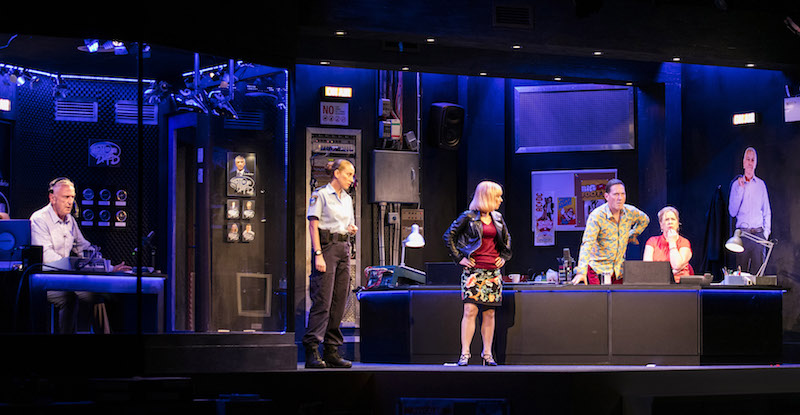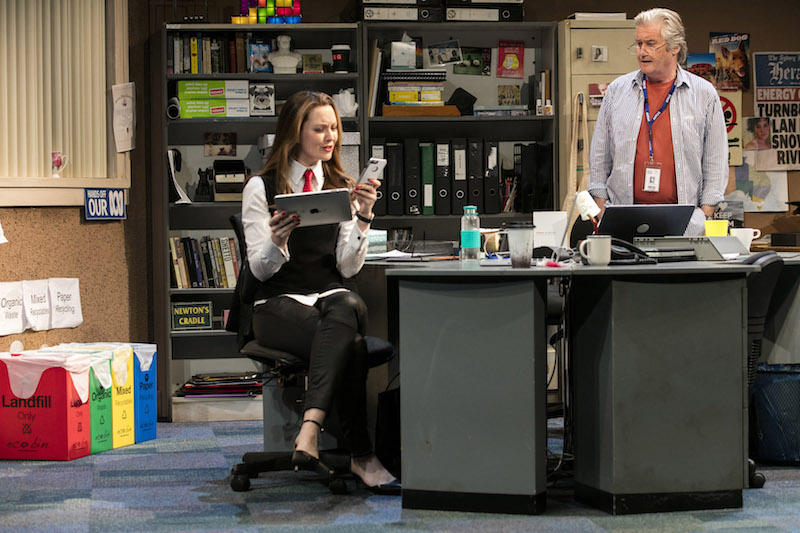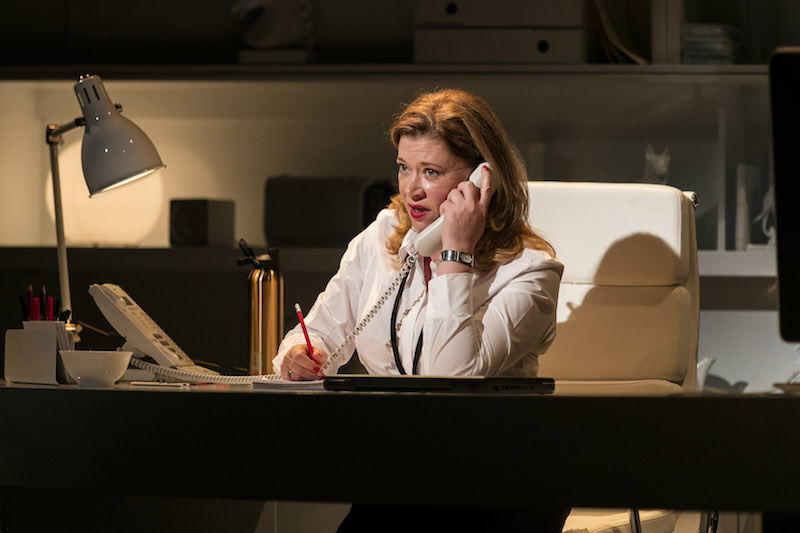Jonathan Biggins has tuned into the zeitgeist with his new play Talk, which looks at modern journalism, and the impact of social media and the 24-hour news cycle. It’s clearly a hot-button subject in this post-truth, Trumpian world of “alternative facts”, and there was lots of animated discussion in the opening night foyer about the issues raised.
 John Waters, Helen Christinson, Lucia Mastrantone, Andrew Tighe and Valerie Bader in Talk. Photograph © Brett Boardman
John Waters, Helen Christinson, Lucia Mastrantone, Andrew Tighe and Valerie Bader in Talk. Photograph © Brett Boardman
There are some terrific performances and the production is well staged but the play itself, which Biggins himself directs for Sydney Theatre Company, is not great drama. Instead, it feels as if the thinly drawn characters are all there to represent a different side of the debate.. As a satire, it lacks genuine bite and insight, and there aren’t a huge number of laughs. In many ways, it is not dissimilar to some of David Williamson’s more recent comedies – which audiences invariably seem to enjoy more than critics.
Talk unfolds across three different media organisations on a clever two-tier set by designer Mark Thompson. Atop the stage is a commercial radio station where right-wing, talkback shock-jock John Behan (John Waters) rules the airwaves, with his faithful producer (Valerie Bader) supporting him from her office outside his glass-box studio.
Below is the editor’s office of the Daily Telegraph where it’s the first day in the job for tough-as-nails acting editor Julie Scott (Hannah Waterman). Meanwhile, over at the ABC, old-school veteran radio journo Taffy Campbell (Peter Kowitz) is packing his bags on his final day in the job after 38 years of service.
 Paige Gardiner and Peter Kowitz. Photograph © Brett Boardman
Paige Gardiner and Peter Kowitz. Photograph © Brett Boardman
Behan has the kind of clout that politicians fear. However, yesterday he overstepped the mark when he told his listeners about the past criminal history of an alleged sex offender. Now the trial has had to be aborted and two police officers (Ben Wood and Helen Christinson) have arrived to arrest him for contempt of court. But instead of going quietly, Behan locks himself in his studio and continues to broadcast live – to the delight of the station manager (Andrew Tighe) – whipping up his listeners to take matters into their own hands in the western suburbs where the alleged paedophile is holed up.
Meanwhile, the Telegraph and ABC must decide how to respond. Scott has commercial and political considerations to take into account when deciding how to spin the story. However, she and her staff (Tighe and Kenneth Moraleda) are not above becoming actively involved in inflating the crisis. Meanwhile, at the ABC, Taffy – the only character with any moral integrity – is trying to instil some journalistic nous and ethics into his junior colleague Danielle Rowesthorne (Paige Gardiner) whose idea of delivering news is to parlay what is happening on social media. “Social media’s just talkback radio with a bigger switch board,” says Taffy. But it falls on deaf ears as Dani sets out to live blog the story without bothering to fact check or do any investigative work of her own.
So where is the truth in all this? Biggins raises all kinds of timely issues but with characters that feel two-dimensional at most and little of the humour firing, the play runs a sluggish one hour 40-minutes and feels longer despite the best efforts of the cast. The final revelation – which should shock – has little impact.
That said, Waters is superb as Behan. With his smooth, radio-friendly voice, he exudes exactly the right kind of laid-back, suave, cocky confidence of the radio host who holds far too much sway – and knows it. With excellent support from Bader as his producer, these scenes ring relatively true, as do the Daily Telegraph scenes with a terrific, ballsy performance from Waterman.
 Hannah Waterman. Photograph @ Brett Boardman
Hannah Waterman. Photograph @ Brett Boardman
Kowitz is also persuasive as the old-school Taffy, but the character of Dani – who clearly represents much of what angers Biggins – becomes merely irritating. Other characters such as the commercial station manager and the police media liaison officer (Lucia Mastrantone) are complete caricatures.
Biggins is a proven director with impressive productions of plays such as Noises Off for STC under his belt. He also wrote a very successful comedy for STC called Australia Day and is, of course, one of the long-time writers and performers of The Wharf Revue. Perhaps it would have been better had someone else directed Talk, and brought an outside eye to the material. As it is, the topic resonates but the play fails to fire on all cylinders.
Talk plays at the Drama Theatre, Sydney Opera House until May 20.











Comments
Log in to join the conversation.